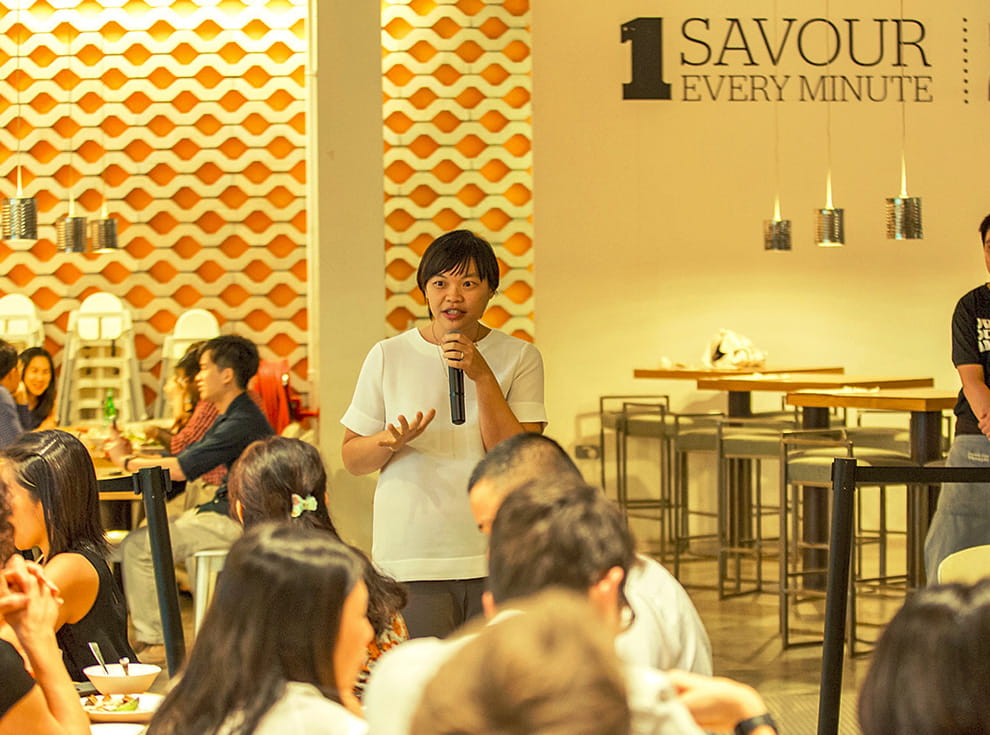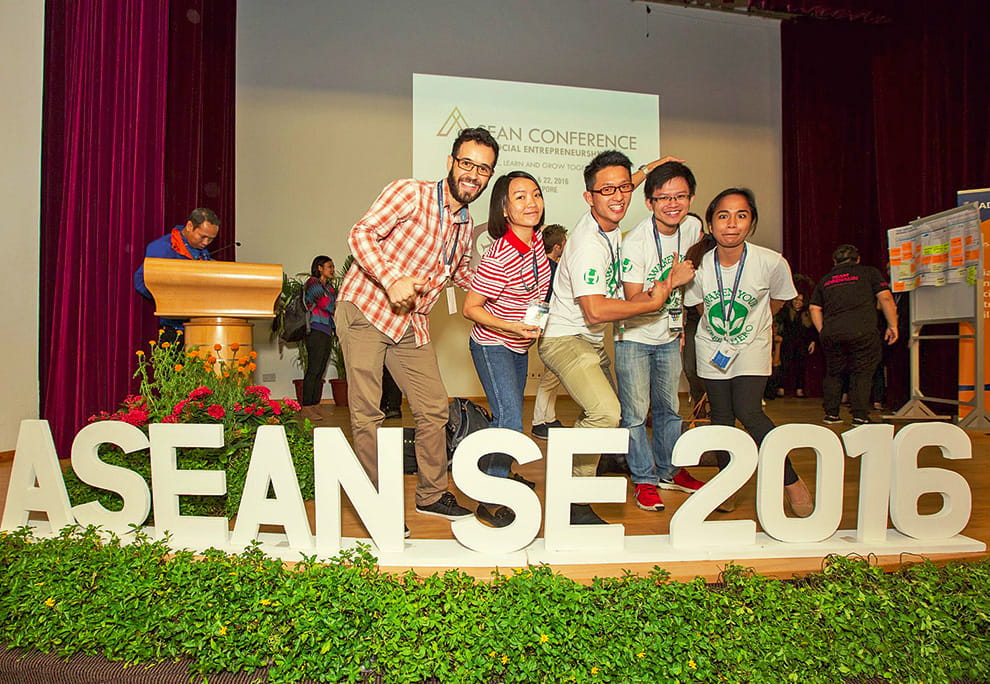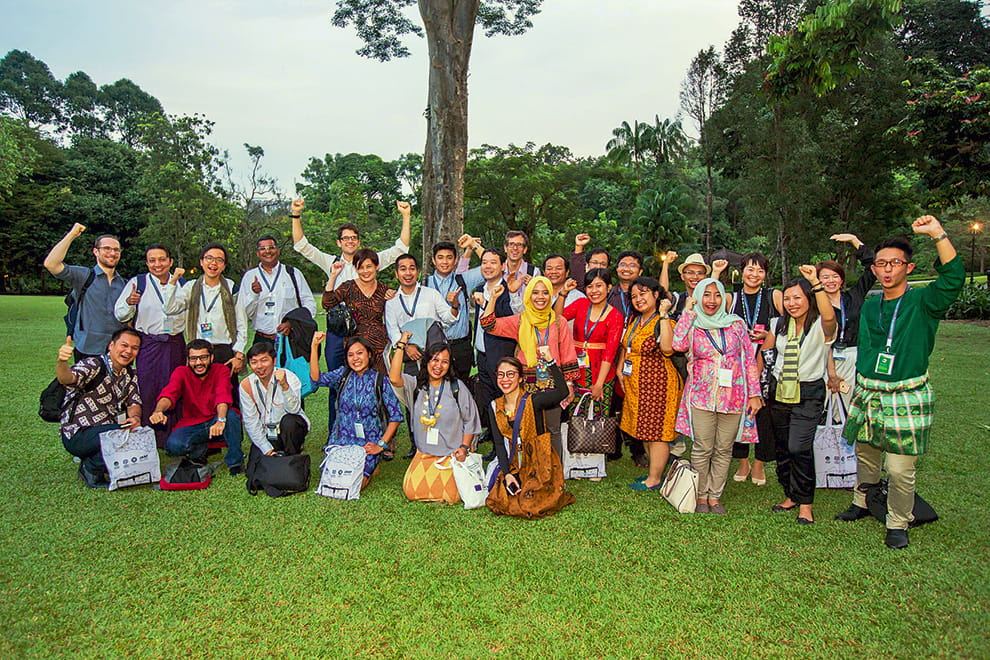Stories > Power Networks
Power Networks
The inaugural Asean Conference on Social Entrepreneurship saw 50 social enterprises from all 10 Asean countries collaborate on initiatives to uplift lives and effect positive change.
BY DESMOND NG

Nominated Member of Parliament Kuik Shiao-Yin, who is also creative director of social enterprise The Thought Collective, sharing her experiences with participants.
here is strength in numbers, as participants of the inaugural Asean Conference on Social Entrepreneurship found out. Held in Singapore in July 2016 and Jakarta in October, the conference, the first of its kind on such a scale for South-east Asian social entrepreneurs, fosters collaborations among social enterprises (SEs), supporting organisations, governments and academia. The aim is to build a stronger social entrepreneurship ecosystem in the region.
A total of 50 SEs from the 10 Asean countries were invited to attend the conference, which culminated in three collaborative projects, initiated by 12 Asean SEs. Participants included SE Backstreet Academy, which was co-founded by Jamon Mok, an alumni of the Singapore International Foundation’s (SIF) Young Social Entrepreneurs (YSE) programme; and Malaysian SE Batik Boutique, which hosted YSE teams during their study visit to Kuala Lumpur in 2016.
Backstreet Academy is a peer-to-peer impact travel platform that enables disadvantaged communities to grow their income by providing unique experiences to travellers. Batik Boutique provides skills training and employment to help women from low-income families in Malaysia break the poverty cycle.
The conference is organised by UnLtd Indonesia, an organisation that supports social entrepreneurship in Indonesia, together with the SIF. It is supported by the Asean Foundation, which promotes shared prosperity and a sustainable future for the people of all Asean countries, and the Japan-Asean Solidarity Fund, which promotes education and cultural exchange and strengthens Japan-Asean cooperation.
The first leg of the conference, held in Singapore on July 21 and 22, focused on five sectors: Youth and Education, Environment, Health and Disability, Culture and Tourism, and Food and Agriculture. The 50 participating SEs were divided to work in sector-based groups. Each group had to provide an action plan and tangible solutions for a problem they had identified in their sector.

The conference provided a platform for social enterprises from Asean to collaborate on fi nding solutions to regional problems.
Participants took part in interactive workshops, as well as plenary sessions and panel discussions led by representatives from organisations such as Oxfam International, an international confederation of charitable organisations working to alleviate global poverty, and AirAsia Foundation, the philanthropic arm of the AirAsia Group, which supports social entrepreneurship, equal opportunity and innovation across the Asean region.
“Despite coming from different backgrounds and work cultures, we were able to complement each other, as we have diverse skills, strengths, networks and experiences to share.”
Suri Filan, co-founder of TripAbility
A highlight of the event was a pitching session in which nine teams presented their collaborative ideas. The audience and a panel, comprising country partners and sector experts, voted for the top three projects. The three collaborative projects – one each from the sectors of Food and Agriculture, Culture and Tourism, and Health and Disability – were given three months to fine-tune their ideas.
They met again in Jakarta on Oct 26 to present their plans at the Project Showcase of the conference. This was attended by over 100 people from Asean, Japan and Australia, including SEs, business incubators and non-governmental organisations.
COLLABORATING FOR GOOD
Following their presentations, the three projects were launched during the showcase. They are TripAbility: Travel for all Abilities, The Agrigator Platform and Map for Good: Follow the Impact Trail.
TripAbility: Travel for all Abilities is an online tourism platform initiated by three SEs – Kerjabilitas from Indonesia, Epic Arts Cafe from Cambodia and DNetwork from Indonesia. The online portal provides travel information to people with disabilities on accessible tourism destinations and facilities, with the aim of promoting barrier-free travel within South-east Asia. The portal will feature peer reviews and ratings of businesses, tourism destinations and facilities that are disability-friendly. It will eventually offer tailor-made tours, holiday packages and bookings directly on its platform.
The Agrigator Platform provides a verified database of socially conscious food producers in South-east Asia. It is the brainchild of three SEs working in the agriculture sector – Javara from Indonesia, NokHook from Thailand and DVIC from Vietnam. The platform aims to connect investors and buyers around the world with businesses in Asia that share a common purpose of creating social impact.
Map for Good: Follow the Impact Trail is a partnership between six SEs – Color Silk, Kinyei and Friends International from Cambodia; Batik Boutique from Malaysia; Ock Pop Tok from Laos; and Backstreet Academy from Singapore. They are designing and producing a map that guides travellers to SEs in Asean countries. These SEs will include tour agents, restaurants and retail shops. The map will be sold by the SEs and select partner organisations, and also made available online.

Social entrepreneurs and conference partners at the Singapore Botanic Gardens.
TripAbility’s co-founder, Suri Filan, who is from DNetwork, says that the conference has been important in bringing SEs and partners from different cultures and background together. She adds: “Despite coming from different backgrounds and work cultures, we were able to complement each other, as we have diverse skills, strengths, networks and experiences to share.”
Suri hopes that by promoting accessible tourism for travellers with disabilities, they can create a new tourism market and build a more inclusive society. She says: “We hope that our platform will help to raise awareness of equal rights for people of all abilities and the importance of having an inclusive community.”
Romy Cahyadi, executive director of UnLtd Indonesia, says that the conference echoes the spirit of the Asean Economic Community, which was established in 2015 with the aim of fostering regional economic integration. He says: “It is timely for SEs to form collaborations to better address social and environmental challenges, while advancing more equitable economic growth in the region.”
